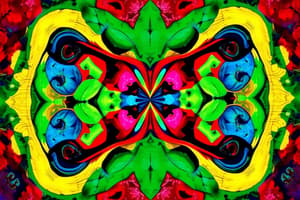Podcast
Questions and Answers
How does meiosis differ from mitosis?
How does meiosis differ from mitosis?
Meiosis is a type of cell division that produces 4 cells, each with half the number of chromosomes as a parent cell. Mitosis produces 2 cells with 46 chromosomes.
What is a karyotype?
What is a karyotype?
A display of the 46 chromosomes of an individual.
How are homologous chromosomes related?
How are homologous chromosomes related?
Each in a pair carries the same sequence of genes controlling the same inherited characteristics.
What is different chromosomally between males and females?
What is different chromosomally between males and females?
What is the difference between a haploid and a diploid cell?
What is the difference between a haploid and a diploid cell?
How is the amount of chromosomes represented?
How is the amount of chromosomes represented?
What are the only cells in humans that are haploid?
What are the only cells in humans that are haploid?
Define homologous chromosomes.
Define homologous chromosomes.
Why is fertilization necessary?
Why is fertilization necessary?
Define zygote.
Define zygote.
What would happen if meiosis did not occur?
What would happen if meiosis did not occur?
What are the 2 major ways meiosis is different than mitosis?
What are the 2 major ways meiosis is different than mitosis?
When is the number of chromosomes split in half during cell division of meiosis?
When is the number of chromosomes split in half during cell division of meiosis?
What two differences should you know when talking about what is divided?
What two differences should you know when talking about what is divided?
What separates in Meiosis 1?
What separates in Meiosis 1?
What separates in Meiosis 2?
What separates in Meiosis 2?
What is a tetrad?
What is a tetrad?
When crossover occurs, what is being exchanged between what?
When crossover occurs, what is being exchanged between what?
What separates during Anaphase 1?
What separates during Anaphase 1?
In Telophase/Cytokinesis 1, are the two cells produced here haploid or diploid?
In Telophase/Cytokinesis 1, are the two cells produced here haploid or diploid?
In Anaphase 2, what moves to either poles here?
In Anaphase 2, what moves to either poles here?
In Telophase/Cytokinesis 2, how many final cells are there? Are they haploid or diploid?
In Telophase/Cytokinesis 2, how many final cells are there? Are they haploid or diploid?
How many chromosomes do humans have?
How many chromosomes do humans have?
How many homologous pairs do humans have?
How many homologous pairs do humans have?
Explain the steps in Prophase 1.
Explain the steps in Prophase 1.
How is a diploid different?
How is a diploid different?
How are haploids different?
How are haploids different?
What is the diploid number?
What is the diploid number?
What is the haploid number?
What is the haploid number?
How many chromosomes are in an egg cell?
How many chromosomes are in an egg cell?
How many chromosomes are in a brain cell?
How many chromosomes are in a brain cell?
How many chromosomes are in a skin cell?
How many chromosomes are in a skin cell?
How many pairs of homologous chromosomes?
How many pairs of homologous chromosomes?
How many chromosomes in a cell produced by mitosis?
How many chromosomes in a cell produced by mitosis?
How many chromosomes in a cell produced by meiosis?
How many chromosomes in a cell produced by meiosis?
Flashcards are hidden until you start studying
Study Notes
Meiosis vs. Mitosis
- Meiosis results in 4 cells, each with half the number of chromosomes (haploid), while mitosis produces 2 cells with the same number of chromosomes (diploid).
- Mitosis maintains chromosome number, meiosis reduces it for gamete formation.
Karyotype
- A karyotype displays the 46 chromosomes of an individual, used to analyze chromosomal abnormalities.
Homologous Chromosomes
- Homologous chromosomes are pairs that carry the same sequence of genes, controlling inherited traits, pairing during meiosis.
Chromosomal Differences in Sexes
- Females have 46 chromosomes with 23 homologous pairs; males have 46 chromosomes with one pair that is not homologous.
Haploid vs. Diploid
- Diploid cells contain two homologous sets of chromosomes (2n=46), while haploid cells have a single set (n=23), produced during meiosis.
Gametes
- Human gametes are haploid sex cells (sperm and egg) containing only one chromosome from each homologous pair.
Zygote Formation
- Fertilization merges the nuclei of haploid sperm and egg cells to form a zygote, the first cell of a new organism.
Consequences of Missing Meiosis
- Without meiosis, fertilization would produce organisms with double the number of chromosomes, leading to genetic instability.
Chromosome Separation in Meiosis
- In Meiosis I, homologous chromosomes separate; in Meiosis II, sister chromatids separate, forming haploid daughter cells in both divisions.
Tetrad and Crossover
- A tetrad consists of homologous chromosome pairs with four chromatids; crossover involves the exchange of genetic material between sister chromatids.
Chromosome Distribution in Anaphase
- During Anaphase I, homologous chromosomes separate; during Anaphase II, sister chromatids move to opposite poles.
Cell Division Outcomes
- Telophase/Cytokinesis I results in two haploid cells; Telophase/Cytokinesis II concludes with four haploid daughter cells.
Human Chromosome Count
- Humans have 46 chromosomes in somatic cells, consisting of 23 homologous pairs, while gametes have 23 unpaired chromosomes.
Mitosis vs. Meiosis Products
- Mitosis yields diploid cells with 46 chromosomes, while meiosis produces haploid cells with 23 chromosomes.
Chromosomes in Specific Cells
- Egg cells contain 23 chromosomes; brain and skin cells each contain 46 chromosomes.
Homologous Pairs
- There are 23 homologous pairs in human cells, contributing to genetic diversity during reproduction.
Summary of Prophase I
- Prophase I involves tetrad formation where homologous chromosomes pair up and may undergo crossing over to exchange genetic material.
Studying That Suits You
Use AI to generate personalized quizzes and flashcards to suit your learning preferences.




